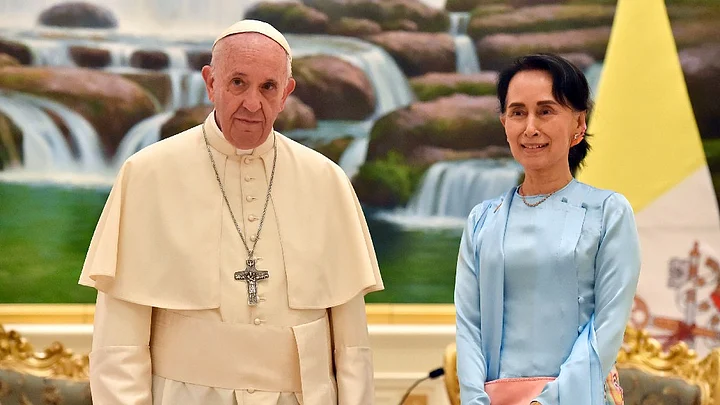Pope Francis on Tuesday, 28 November, urged the leaders of Buddhist-majority Myanmar, mired in a crisis over the fate of Muslim Rohingya people, to commit themselves to justice, human rights and respect for “each ethnic group and its identity”.
The pope avoided a diplomatic backlash by not using the highly charged term “Rohingya” in his addresses to officials, including leader Aung San Suu Kyi.
However, his words were applicable to members of the beleaguered minority, who Myanmar does not recognise as citizens or as members of a distinct ethnic group.
More than 620,000 Rohingya have fled to Bangladesh – where the pope heads on Thursday, 30 November – since the end of August, escaping from a military crackdown that Washington has said included “horrendous atrocities” aimed at “ethnic cleansing”.
Francis made his comments in Naypyitaw, the country’s capital, where he was received by Suu Kyi, the Nobel peace laureate and champion of democracy who has faced international criticism for expressing doubts about the reports of rights abuses against the Rohingya and failing to condemn the military.
The future of Myanmar must be peace, a peace based on respect for the dignity and rights of each member of society, respect for each ethnic group and its identity, respect for the rule of law, and respect for a democratic order that enables each individual and every group – none excluded – to offer its legitimate contribution to the common good.Pope Francis
Myanmar rejects the term “Rohingya” and its use, with most people instead referring to the Muslim minority in Rakhine state as illegal migrants from neighbouring Bangladesh.
The pope had used the word Rohingya in two appeals from the Vatican this year.
But before the diplomatically risky trip, the pope’s own advisers recommended that he not use it inMyanmar, lest he set off a diplomatic incident that could turn the country’s military and government against minority Christians.
Human rights groups such as Amnesty International, which has accused the army of “crimes against humanity”, had urged him to utter it.
A hardline group of Buddhist monks warned on Monday – without elaborating – that there would be "a response" if he spoke openly about the Rohingya.
(The article has been edited for length.)
(Breathe In, Breathe Out: Are you finding it tough to breathe polluted air? Join hands with FIT to find #PollutionKaSolution. Send in your suggestions to fit@thequint.com or WhatsApp @ +919999008335)
(At The Quint, we question everything. Play an active role in shaping our journalism by becoming a member today.)
